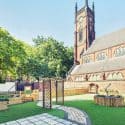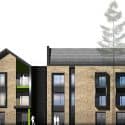Some parents have asked “what should I expect from my son/daughter’s stay at Nightingale House?” Here is a little insight…
Nightingale House is our newest residential home for 18-25 year old’s with complex disabilities or acquired brain injury. We offer any length of residence; whether that be utilising the short break services or longer term accommodation. We designed Nightingale House to be a fantastic opportunity for teenagers and young adults to live in surroundings that fit in with their age and stage of development. By embracing new technologies, the facility itself is designed to give the best level of care, but our team go beyond that by personalising fun activities and developing strong bonds with those in their care through tactile play.
When we first meet young people who will stay with us, there is an initial assessment by sitting down with them and their families and seeing what they like to do. Then once our key workers get to know them when they stay and learn little nuggets of information, we use those to further build upon the support and activities we offer them.
We see the value in creating memories and participating in activities that our residents love. We have the capacity to ensure that their physical needs are met. Exploring hobbies that they are passionate about can be an incredible way to break down any barriers with that person. By earning trust and creating a fun environment, you can de-escalate any behaviour which may challenge and build a great relationship with them. Providing positive, unforgettable experiences can encourage communication and allows the opportunity to open up. For example, one of our residents adores horses, so we took them horse riding. Seemingly insignificant events can make a profound difference to an individual and transform the way they interact and ultimately, increase happiness. That in itself is extremely important to their quality of life and well-being.
Some examples of trips this year include holidays to Blackpool, days out at a safari park and travelling down to Essex to see family. Nightingale House is centrally based, so the young people have access to the local facilities in the evenings and weekends, such as cinema, ten-pin bowling, nail salons, local parks, etc. July was a big month for us for birthdays, so the individuals had BBQ parties shared with friends from school. We played games and hired bouncy castles. They absolutely loved it.
Another thing we enjoy doing is creating a ‘life-story box’ with the people in our care. As they move from children’s services to adult’s services, it can move along their journey with them. It provides something invaluable that they can keep, treasure, and look back on fondly.
The quality of support we can provide for each and every individual we look after is paramount. A huge factor of this is daily activity and we are always questioning what we can do to improve lives. We’d love to discuss how we can tailor experiences for your son or daughter, be that at Nightingale House, in your home or in the community, so we’d love to hear from you.
Please call us today on 01332 343 882 and arrange a time to pop in for a coffee and a chat.








